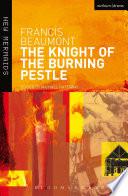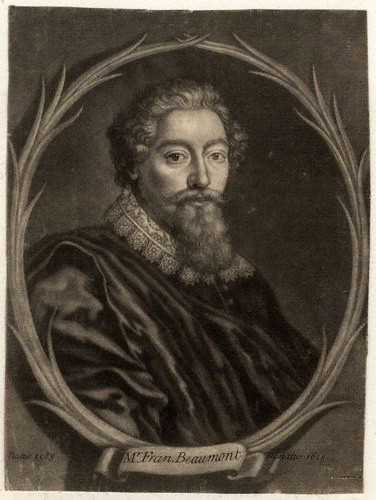Francis Beaumont was a dramatist in the English Renaissance theatre, most famous for his collaborations with John Fletcher.
Beaumont was the son of Sir Francis Beaumont of Grace Dieu, near Thringstone in Leicestershire, a justice of the common pleas. His mother was Anne, the daughter of Sir George Pierrepont , of Holme Pierrepont , and his wife Winnifred Twaits. Beaumont was born at the family seat and was educated at Broadgates Hall at age thirteen. Following the death of his father in 1598, he left university without a degree and followed in his father's footsteps by entering the Inner Temple in London in 1600.
Accounts suggest that Beaumont did not work long as a lawyer. He became a student of poet and playwright Ben Jonson; he was also acquainted with Michael Drayton and other poets and dramatists, and decided that was where his passion lay. His first work, Salmacis and Hermaphroditus, appeared in 1602. The 1911 edition of the Encyclopædia Britannica describes the work as "not on the whole discreditable to a lad of eighteen, fresh from the popular love-poems of Marlowe and Shakespeare, which it naturally exceeds in long-winded and fantastic diffusion of episodes and conceits." In 1605, Beaumont wrote commendatory verses to Jonson's Volpone.
Beaumont's collaboration with Fletcher may have begun as early as 1605. They had both hit an obstacle early in their dramatic careers with notable failures; Beaumont's The Knight of the Burning Pestle, first performed by the Children of the Blackfriars in 1607, was rejected by an audience who, the publisher's epistle to the 1613 quarto claims, failed to note "the privie mark of irony about it;" that is, they took Beaumont's satire of old-fashioned drama as an old-fashioned drama. The play received a lukewarm reception. The following year, Fletcher's Faithful Shepherdess failed on the same stage. In 1609, however, the two collaborated on Philaster, which was performed by the King's Men at the Globe Theatre and at Blackfriars. The play was a popular success, not only launching the careers of the two playwrights but also sparking a new taste for tragicomedy. According to a mid-century anecdote related by John Aubrey, they lived in the same house on the Bankside in Southwark, "sharing everything in the closest intimacy." About 1613 Beaumont married Ursula Isley, daughter and co-heiress of Henry Isley of Sundridge in Kent, by whom he had two daughters, one posthumous. He had a stroke between February and October 1613, after which he wrote no more plays, but was able to write an elegy for Lady Penelope Clifton, who died 26 October 1613. Beaumont died in 1616 and was buried in Westminster Abbey. Although today Beaumont is remembered as a dramatist, during his lifetime he was also celebrated as a poet.
✵
1584 – 6. March 1616

